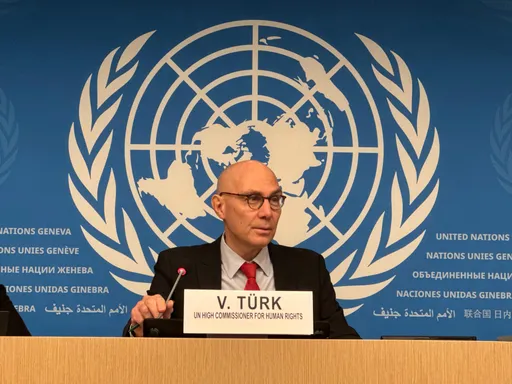KYIV, Ukraine — During his inauguration on Monday, Ukrainian President Volodymir Zelensky started a political tornado that may eclipse his own skyrocketing rise to power – or let a legion of opponents nip his promises and plans in the bud.
Addressing the Verkhovna Rada, Ukraine’s lower house of parliament dominated by the loyalist of his presidential predecessor and arch-enemy Petro Poroshenko, the small-framed 41-year-old comedian sounded aggressive.
“My election proves that our citizens are tired of the experienced, pompous, professional politicians who over the 28 years [of Ukraine’s independence] have created a country of opportunities — opportunities to bribe, steal and pluck the resources,” Zelensky, who won the April 21 election with 73 percent of the vote, told lawmakers.
Zelensky urged them to help him negotiate a ceasefire and a prisoner swap with pro-Russian separatists in two southeastern provinces, to dismiss key security officials appointed by Poroshenko, to vote in a law to remove lawmakers’ immunity from prosecution and to adopt tougher anti-corruption laws.
And then he dissolved the parliament.
The move was widely expected on Zelensky’s part, but its legality reflects Ukraine’s perennial problems with the interpretation of its complex and often contradictory laws.
“It’s dubious, but most constitutional experts believe that it’s not legal,” Oleksiy Haran, a politics professor at the Kyiv Mohila Academy, told TRT World.
If a ruling coalition consists of fewer than a half of Rada’s lawmakers – and that is the case since February – the incumbent can dissolve it, Zelensky’s team claims.
But a group of pro-Poroshenko lawmakers left the coalition last week in a move that technically requires the establishment of a new coalition – and prevents Zelensky from disbarring the parliament.
"There are no legal grounds for this," Volodymir Aryev, a lawmaker with Petro Poroshenko's bloc, told journalists. "This violation of the constitution as [the president's] first move creates huge chaos and a crisis."
Several lawmakers threatened to overturn the dissolution in courts, but some political forces formerly opposed to Zelensky are now ready for the snap vote.
“I believe that the current parliament earned a snap election,” Yulia Tymoshenko, former prime minister and head of the Homeland political party, said in televised remarks. “We, Homeland, are ready. I believe that the changes everyone is waiting for have begun.”
For most of 2018, Tymoshenko, whose trademark peasant braids made her a symbol of the 2004 pro-Western, anti-Russian protests dubbed the Orange Revolution, was seen as the top presidential hopeful in most of the polls.
But after Zelensky announced his candidacy in January and Poroshenko started a belligerently nationalist election campaign, she came third in the first round of the presidential vote in March.
Another presidential hopeful – who got less than five percent of the vote – accepted Zelensky’s decision as a step to appease the public.
“There are no constitutional grounds to dissolve the Rada, this is a purely political decision, but we support the snap election because the public expects it," leader of the nationalist Radical Party Oleh Lyashko told journalists.
Zelensky did not announce the date of the snap election, but it may take place within two months instead of the original vote originally, which was scheduled for October 27.
Ukraine is a parliamentary republic, and to wield real power, Zelensky needs a majority for his Servant of the People party, which was named after the television series that paved the way for his presidency.
In the series, he played a schoolteacher who unexpectedly becomes president after his obscene tirade about Ukraine’s political establishment makes him a YouTube star.
The nascent party leads in the polls, but experts say that Zelensky is the only driving force behind the virtual project whose members and programme remain unknown.
“Zelensky is trying to convert his political success into the success of this party,” analyst Haran said.
The snap election is one of many more political conundrums Zelensky is facing.
The largest one is Russia’s 2014 annexation of Crimea and its support to separatists in the Donetsk and Luhansk regions. The Moscow-backed armed rebellion against the central government became Europe’s hottest armed conflict, claiming more than 13,000 lives and displacing millions.
Yet, apart from populist statements, Zelensky hasn’t come up with a concrete plan for the peace settlement. After all, he is not the one to call the shots, experts say.
"The solution largely depends on [Russian President Vladimir] Putin,” political analyst Volodymir Fesenko told TRT World. “Will Putin agree to a compromise, to a ceasefire – we don't know.”
The Kremlin has not congratulated Zelensky with his election and says Putin still has no plans to meet him. “No contacts are on the agenda for now," Putin's spokesman Dmitry Peskov told journalists Monday.
However, Putin’s critics are enthusiastic about Zelensky’s success.
The very fact Zelensky won the election "is very important for the future of Russia that still lives in the 20th century vegetating on the outskirts of global progress", Russian opposition leader Gennady Gudkov told TRT World.
Since the 2014 Euromaidan protests that ousted pro-Russian President Viktor Yanukovych, Ukraine’s authorities have been pushing the West to impose sanctions on Russia, and Zelensky continues the nudge.
“I’d like to ask you to make sure the US continues to strengthen sanctions against Russia,” he told a US delegation at the inauguration.
Zelensky pledged to continue his predecessor’s efforts to make Ukraine part of the European Union and NATO. Vadim Pristayko, Ukraine’s current ambassador to NATO, may become Zelensky’s new foreign minister, according to media reports.
But both blocs are far from ready to embrace the nation of 44 million with a separatist problem, a struggling economy, endemic corruption and fertile black-earth soils whose produce may reshape Europe’s food market.
“We have chosen a path to Europe, but Europe is not somewhere out there, Europe is here,” Zelensky said during the inauguration pointing at his head and referring to a common need to develop a ‘European’ mentality. “This is our common dream.”























